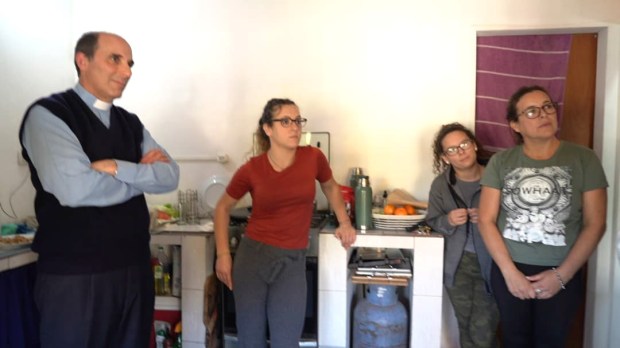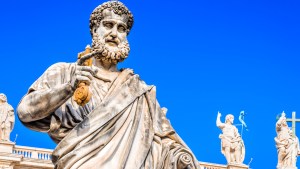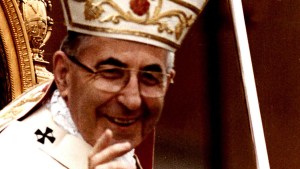“Roxana is a courageous mother who never separated herself from the cross of her daughter Candela,” says Fr. José Dabusti. It was Fr. Dabusti who suggested that Roxana Giarda, Candela’s mother, invoke Pope John Paul I to intercede for the health of her daughter on July 22, 2011—the night when the doctors told the family that the girl wasn’t going to make it through the night.
The miraculous healing of Candela, who suffered from a severe form of encephalopathy, will allow Pope Albino Luciani (John Paul I) to be beatified. The decree was recently authorized by Pope Francis.
Fr. Dabusti, who is currently 56 years old, has been a priest for 30 years and is now the parish priest of the Church of Our Lady of Mercy in the neighborhood of Belgrano, Buenos Aires, Argentina. He shared with Aleteia details of the miracle and his devotion for John Paul I.
He says that he chose the “smiling pope” to intercede for Candela’s health because since he was 13 years old he has carried “in his memory and in his heart the figure, the person and the testimony of joy” of the pope who was on the Throne of Peter for only 33 days.
José Dabusti, as a teenager in 1978, was impressed when Albino Luciani was elected pope. From the beginning, he admired “his deep humility and the simplicity he showed in his priesthood and in his person.”
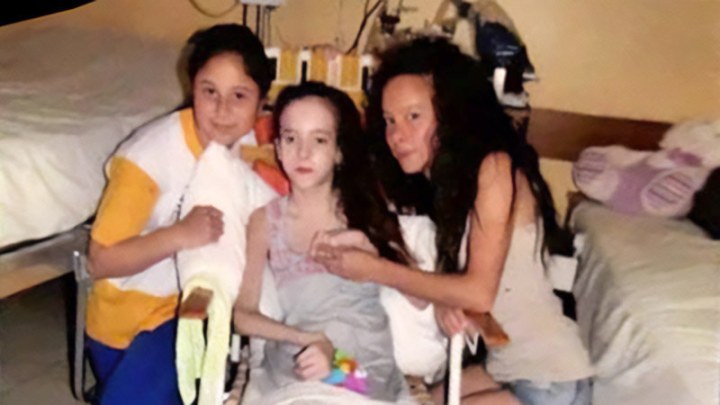
The affection for John Paul I
The parish priest recalls that after the death of the 263rd Successor of Peter, he developed “a deep affection, a devotion” toward him. Dabusti says that this always led him to entrust himself to John Paul I as he was “growing up and discerning a priestly vocation.”
“Also,” Dabusti said, “during my formation I had the opportunity to ask people who went to Rome to pray at the tomb of John Paul I that I would be a good priest.”
However, Father Dabusti admits that despite his devotion “there are only a few times that I have asked someone to invoke John Paul I, even when his heroic virtues were already in the process of being studied.”
The hospital visit
Fr. Debusti recalled how the events of July 22, 2011, came about. “When Candela was hospitalized at the Favaloro Foundation with a very serious health condition, her mother came to the parish of Our Lady of La Rabida, where I was pastor at the time, and asked me to visit her daughter who was in intensive care in Pediatrics.”
He then recalled the moment when he asked for the intercession of the future blessed: “I went to pray with Roxana and there were some other nurses. We all prayed together, we put our hand on Candela’s little body and there I proposed that we should pray through the intercession of John Paul I for her cure.”
The little girl’s mother did not know who Albino Luciani was, so Fr. Dabusti explained briefly, and with all his conviction to Mrs. Giarda the reasons why John Paul I could help them in that desperate situation. “It was a spontaneous prayer, an inspiration, born from the heart.”
The miracle
“On the very night of July 22, 2011, the first signs of improvement manifested themselves and when the next morning came, she had survived the night,” although the doctors said she would die before sunrise. “So it was that day by day she got better. She was taken off the respirator, they took her out of the intensive care unit…”
“The doctors said that Candela was going to remain in a vegetative state or with profound brain damage.” Before the miracle, her clinical condition was very serious, characterized by numerous daily epileptic seizures and an infection caused by bronchopneumonia.
Science
Despite the fact that a theological and medical commission has judged the case inexplicable to science, there is no lack of skeptical voices. Still, Fr. Dabusti says, “I believe that both science and faith are showing us more and more how they go hand in hand,” because, “more and more they are learning to dialogue and to complement each other.”
Science discovers “that there are not always definitive answers, that God acts with science and beyond it. Many times, so to speak, God works miracles through scientific progress.”
Skeptical people also reject the idea that God uses “intercessors” to perform miracles. “God himself decided to become a man,” argues Dabusti, “just like us. There, He is showing you the value of the human being.”
“Therefore,” he continues, “just as human beings can exercise solidarity on earth, evidently, the intercession of those men and women who have already passed to the Father’s house is very valuable. We believe in the communion of saints.”

Intercessors
Why does God need intercessors? “God can act directly; He does not need intercessors, otherwise He would not be God… God wants to use intercessors on earth and in heaven.”
The priest spoke with agnostic doctors when they were studying the case of Candela’s healing. They “said what they thought, but they were open to see that there were very impressive things in Candela’s recovery. It was something beyond what was foreseeable, scientifically.”
Fr. Dabusti highlights the supernatural power of prayer. “I was looking at Candela’s body (standing) on the left side and her mother was on the right side with other nurses” around her bed. He recalls the strength with which they prayed to God for the girl’s health.
“I was obviously moved by her suffering which had lasted so many months. That was what moved God, and you can’t even imagine the strength and faith of her mother who obtained the miracle from God through the intercession of John Paul I.”
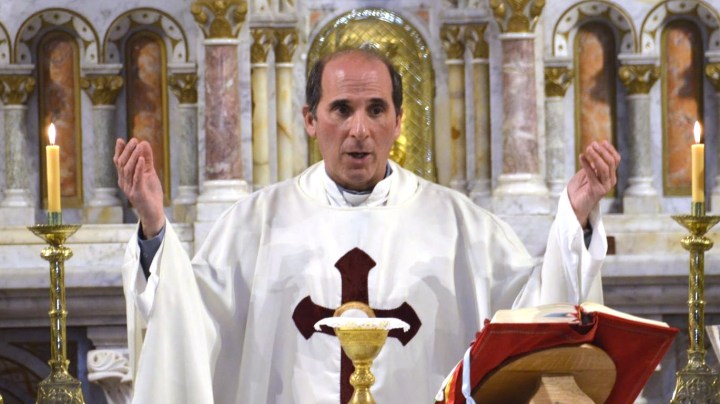
Pope John Paul I
The pontificate of John Paul I was the shortest in history, lasting only 33 days. He was the last Italian pope to date. He was the first Bishop of Rome born in the 20th century, and also the last to die in the 20th century. The year he died, the world witnessed three popes in the Vatican.
“It was a brief pontificate, and nonetheless it was prophetic, because it was the grain of wheat that fell to the ground and died so that it would bear fruit in the successive pontificates, from John Paul II and Benedict XVI to Francis,” popes with “different and complementary profiles,” Father Dabusti says.
